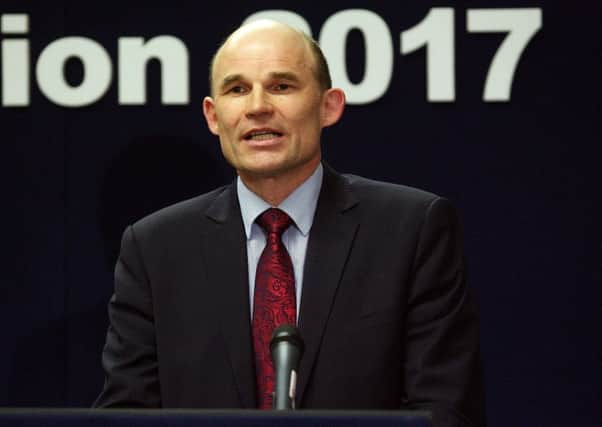Workers at NI’s RoI-owned electricity operator could strike during Brexit date


If a strike proceeds, there will be a risk of “blackouts”, Ulster Unionist MLA Roy Beggs has said.
The Prospect union told the News Letter it is balloting its members on industrial action up to and including a strike at Systems Operators Northern Ireland (SONI), the company tasked with making sure the electricity supply gets to where it is needed.
Advertisement
Hide AdAdvertisement
Hide AdAnd if the strike proceeds it is likely to cause enormous disruption to the Northern Ireland power supply at the end of March — a crucial time when the UK is set to officially leave the EU.
Prospect, however, say the timing is not deliberate.
The union, who represent an overwhelming majority of workers at SONI, say the “bottom line” for members is pay but admitted concerns exist amongst the workforce about the “independence” of SONI — a company which is owned, indirectly, by the Irish government.
SONI has been part of the EirGrid Group of companies since 2009 and EirGrid is, in turn, a state-enterprise owned by the Dublin government.
Asked to address these concerns, a spokesperson for SONI said its licence to operate in Northern Ireland “contains conditions to ensure our independence.”
Advertisement
Hide AdAdvertisement
Hide AdThe spokesperson added: “SONI is compliant with this requirement and has been certified as an independent Transmission System Operator.”
Propsect Northern Ireland negotiation officer Angela Moffatt said: “In a nutshell, SONI workers operate the systems. They are a critical organisation in the electricity sector here. It would be difficult to convey the importance of the job that our members do.
“Put simply, things won’t work without them. In light of that, the decision to ballot for industrial action is one that has not been taken lightly.”
Outlining workers’ concerns, she continued: “Each year, there is a negotiation for a cost-of-living pay award. Since 2016 there hasn’t been one. There are pay claims which are three years in dispute, going into a fourth year. You can see by the length of time this has been going on that this is not a reckless act, it is with absolute reluctance that our members are being faced with this decision.”
Advertisement
Hide AdAdvertisement
Hide AdShe added: “We are aware of concerns from members about the independence of SONI, its relationship with EirGrid and EirGrid’s relationship with the Irish government. As far as we are concerned, we are negotiating with SONI. We are not negotiating with EirGrid. The bottom line for us is pay, or the lack of pay for more than three years.”
A spokesperson for SONI said: “We are disappointed that SONI staff, who are members of the Prospect Union, are actively proceeding with a formal ballot for industrial action in relation to a pay claim.
“SONI has already offered independent arbitration through the Labour Relations Agency to resolve the pay claim; however this has been rejected by the union.”
Robin McCormick, General Manager at SONI said: “We have been engaging with staff and representatives from the Prospect Union over several months in an attempt to reach a resolution to this matter, however, to date, we have been unable to reach a satisfactory outcome.
Advertisement
Hide AdAdvertisement
Hide Ad“The company is continuing to engage with staff and their representatives through the offices of the Labour Relations Agency to resolve the matter. “In addition, the offer of Industrial Arbitration remains on the table, as we believe it to be the best route to a satisfactory outcome for our staff, the organisation and our customers throughout Northern Ireland.”
UUP MLA Roy Beggs, asked about the potential impact of industrial action, said: “SONI is an essential piece of the Northern Ireland electricity infrastructure. Without SONI co-ordinating the dispatch of electricity from our power stations, we risk blackouts.
“SONI staff have a high level of technical expertise and three-to-four years is an exceptionally long time to go without even an inflationary pay increase. I hope that Northern Ireland is not getting caught up in industrial disputes which are occurring in the Republic as a result of the Irish government’s stance on public sector pay.”